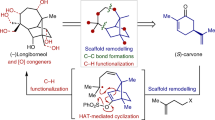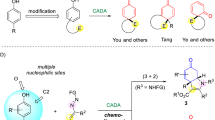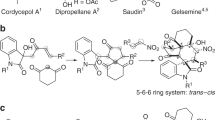Abstract
INTEREST in the diketones octa-3 : 5-diene-2 : 7-dione (I) and oct-4-ene-2 : 7-dione (II) arises mainly from their potential value as intermediates for polyene syntheses.
This is a preview of subscription content, access via your institution
Access options
Subscribe to this journal
Receive 51 print issues and online access
$199.00 per year
only $3.90 per issue
Buy this article
- Purchase on Springer Link
- Instant access to full article PDF
Prices may be subject to local taxes which are calculated during checkout
Similar content being viewed by others
References
Karrer, P., Eugster, C. H., and Perl, S., Helv. Chim. Acta, 32, 1013 (1949).
Karrer, P., and Eugster, C. H., Helv. Chim. Acta, 32, 1934 (1949).
Cason, J., Chem. Rev., 40, 15 (1947).
Zal'kind, Y. S., and Aǐzikovich, M. A., J. Gen. Chem. Russ., 7, 227 (1937).
Bailey, P. S., and Ross, J. H., J. Amer. Chem. Soc., 71, 2370 (1949).
Author information
Authors and Affiliations
Rights and permissions
About this article
Cite this article
SONDHEIMER, F., WEEDON, B. Intermediates for Polyene Syntheses. Nature 165, 483–484 (1950). https://doi.org/10.1038/165483b0
Issue Date:
DOI: https://doi.org/10.1038/165483b0
Comments
By submitting a comment you agree to abide by our Terms and Community Guidelines. If you find something abusive or that does not comply with our terms or guidelines please flag it as inappropriate.



